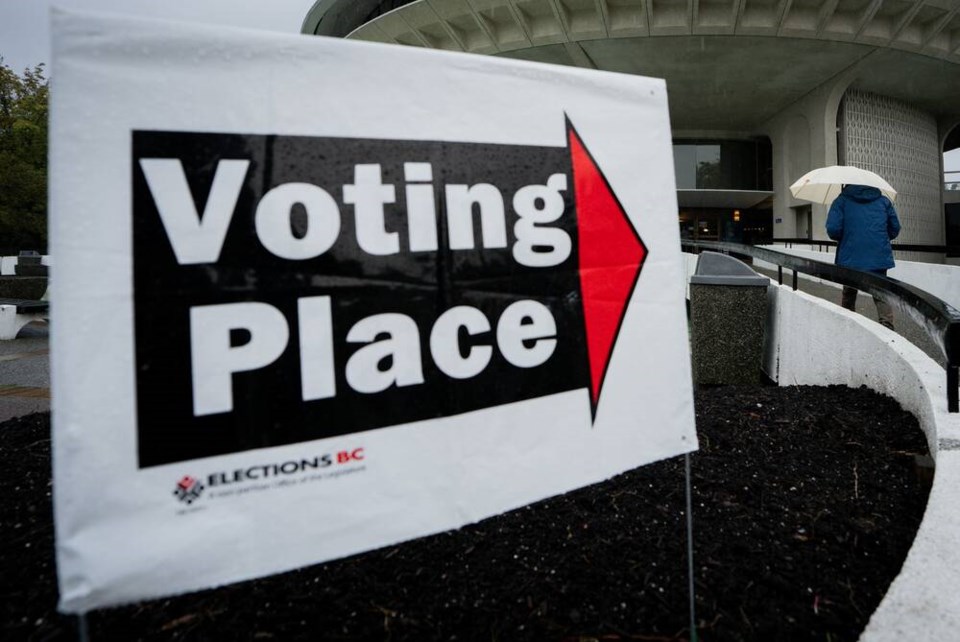Vancouver Islanders who have already endured a highly divisive and protracted provincial election campaign, with the results of two judicial recounts still pending, must now gear up for local-government byelections. Three municipal councillors on Vancouver Island were elected to provincial office in the 2024 provincial election, which triggers byelections for local government in the new year. The next local government general election in B.C. isn’t until Oct. 17, 2026.
The Local Government Act states that an election must be held as soon as practicable after a vacancy occurs. Then, once appointed, the chief election officer must set a general voting day, on a Saturday no later than 80 days after being appointed.
Turnout for local government byelections is typically around 10 per cent compared with 36 per cent turnout for the local-government general election in 2018, for example.
Cowichan Valley MLA-elect Debra Toporowski resigned her North Cowichan councillor seat “effective immediately” on Thursday, saying it was a privilege to serve.
Toporowski, a two-term municipal councillor first elected in 2018, and five-time councillor with Cowichan Tribes, thanked North Cowichan residents for their “confidence and trust” in supporting her to continue to serve the community at the provincial level.
Mayor Rob Douglas said Toporowski’s “unique insight” brought a welcome perspective to the council table and he looks forward to working with her on provincial issues and projects.
Toporowski has served as acting mayor, on the Cowichan Valley Regional District board, the audit and finance committee, Vancouver Island regional library board and First Nations committee.
Esquimalt-Colwood NDP MLA-elect Darlene Rotchford has left her position on Esquimalt’s council.
Esquimalt Mayor Barb Desjardins said the municipality is considering dates for a byelection. “Given the work ahead and holiday season, it will be into the new year,” said Desjardins.
Desjardins said she’s pleased with the riding’s new representative. “We are excited to have a local Esquimalt person with local-government experience as our MLA.”
Sooke Mayor Maja Tait said Friday that Juan de Fuca-Malahat NDP MLA-elect Dana Lajeunesse has yet to resign his seat on Sooke council.
On election night, Oct. 19, the riding of Juan de Fuca-Malahat was in the spotlight as the NDP only had 46 seats to 45 for the Conservatives; 47 seats are needed for a majority.
The NDP’s Lajeunesse led the Conservatives’ Marina Sapozhnikov by just 23 votes, triggering an automatic recount. In the final count of mail-in and absentee ballots Monday, Lajeunesse finished with a more convincing 141-vote lead.
The NDP got one more seat, needed for a majority, from the riding of Surrey-Guildford, which in the final count flipped to NDP from Conservative.
Tait said Lajeunesse has missed three consecutive Sooke council meetings so either he will resign or if he misses the next meeting he will be disqualified.
Lajeunesse is a third generation resident of the Sooke-Otter Point area and represents the riding that was previously held by John Horgan when he was NDP premier.
Lajeunesse could not be reached for comment. Communications officer Astra Lund-Phillips said Lajeunesse is busy with meetings and orientations as a new MLA this week and next.
Tait, who calls Lajeunesse a friend, said council is “excited” for him on his next steps.
“He’s been very committed to his work here in Sooke, particularly on local economic development, having clear approval processes in place, quality infrastructure, safe road and an active transportation network, and really championing Sooke to recognize its local potential,” she said.
He brings a long understanding of the Sooke area to the role of MLA “so it’s exciting to see him make this transition,” said Tait. “I look forward to a really strong working relationship going forward,” she said.
Byelections are required for all sorts of reasons when councillors are no longer able to fulfil their roles and vacancies are created.
“Life happens,” said Tait.
Sooke councillor Brenda Parkinson died in 2019, triggering the byelection that saw Lajeunesse elected and then re-elected in 2022.
Elections B.C.’s role in local byelections is limited to overseeing campaign financing and advertising rules.
The costs of byelections to municipalities are the same as a general election regardless of the anticipated turnout, said Tait, given there’s the same cost for required advertising, ballot printing, mail-out of voter registrations, provision of advance and voting day polling stations, voting machines, election staff, and more.
Sooke budgets about $50,000 a year for elections.



